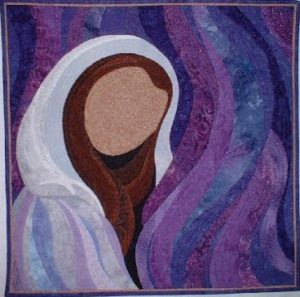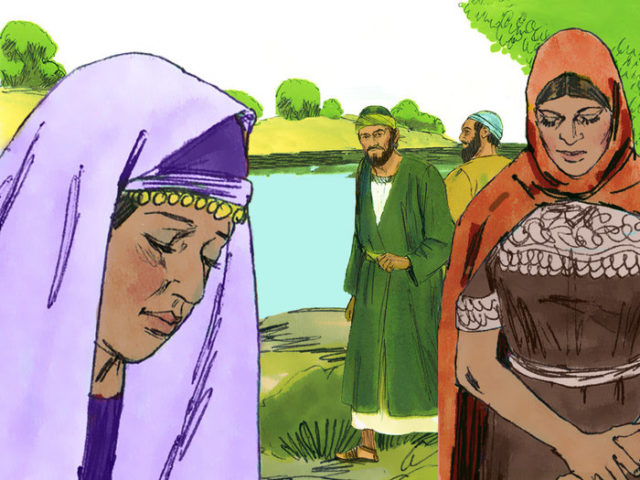
As we anticipate Annual Conference 2017 let us remember how faithful God has been to us. So many good things have happened in the past conference year. I thank God for every one of you, and I look forward to the new, wonderful things God has planned for this conference to do in the year to come.
The theme for this our 231st Annual Conference is “Rise Up and Pray!” I am reminded of Lydia, an early church leader, whose story is found in Acts 16-13-15. She went to the river to pray, and the power of the Holy Spirit was soon at work in her life and among the many lives she touched.
What can we learn from Lydia that we can apply to our lives and to the life of our conference? Let’s ponder the lessons using the word PURPLE.
“P” is for PRAYER
Lydia was a worshiper of God, and the main door into worship is through prayer. Prayer opens us up to the wonder of God, the goodness of God, the direction of God, the forgiveness of God and the power of God.
 Last fall I called our conference to a timely season of prayer and offered every clergy member a book Draw the Circle, by Mark Batterson. Amazing things have been happening among many in of our churches who have chosen to read it and use it as a 40-day study. Lives have been transformed, people have been called into mission work, souls have been delivered from addiction, churches have been healed of divisions and strife, and folks are praying “God-sized” dreams for their communities.
Last fall I called our conference to a timely season of prayer and offered every clergy member a book Draw the Circle, by Mark Batterson. Amazing things have been happening among many in of our churches who have chosen to read it and use it as a 40-day study. Lives have been transformed, people have been called into mission work, souls have been delivered from addiction, churches have been healed of divisions and strife, and folks are praying “God-sized” dreams for their communities.
Prayer remains the most powerful tool we can employ in doing God’s work. Whether you fall on your knees or stand on your feet, let your heart be humbled as your spirit rises up in quiet or ardent prayer. It is more powerful than money, education, influence, religion or fame. I call on all of us to engage in prayer more—more constantly, more deeply, more faithfully, more boldly. Then watch God work.
“U” is for UNIQUE
Lydia was unique woman. Unlike most of the women of her day, she was a wealthy business executive from Thyratira (or modern-day Turkey). We know she was wealthy because she had a house, and she sold purple cloth made from the extract of purple seashells that were rare and expensive. Thanks to her unique gifts of wealth and business experience, God was able to leverage resources for ministry in the early church.
God uses everything we are and everything we have for the work of the Kingdom. Each one of you is unique as well. God has placed into your life a skill-set, a family of origin and a measure of giftedness. Each one of us is different, so that God can accomplish the challenging work of ministry through our collective gifts and graces.
I thank God for the Wesley brothers. John was the devoted evangelist and organizer. Charles was the talented, tenderhearted poet. Their complementary gifts working together set the world on fire with the Methodist movement.
Use your unique gifts, even your shadow experiences, for the unique ministry that God has called you to do.
“R” is for “River”
Lydia went to the river, which is where people typically went to pray when they had no formal place to worship. By going to the river one would congregate with people who were like-minded. But at the river you could also meet seekers who might come looking for a new lease on life. Lydia was a seeker on that day she met the Apostle Paul.
The world is still hungry for the spiritual food that only a life of faith can give. We need to go down to the river to seek out people who need the saving love of Jesus. We cannot just sit in our houses or churches and keep it all to ourselves. Go down to the rivers, the meeting places in your communities, in this world, where there is human need and spiritual emptiness. Go share the love of God.
I love the story of the life of Francis Asbury, the Father of American Methodism. He did not stay in the comfortable cities of his day but went about on horseback preaching the gospel in many remote places. He rode 270,000 miles and preached 16,000 sermons, many of them in churches, homes, fields and campgrounds across Eastern PA.
Go to the “rivers” where children and young people are. Go to the rivers where poverty and despair are rampant. Go to the rivers of complacency and pride to call people to repentance. Go to the rivers of isolation and fear to bring hope. Churches with true disciples take their ministry from the pulpit and pews out to the pavement to seek the lost and embrace the unloved with the heart of Christ.
“P” is for “Persistence”
Lydia had a persistent personality. After her conversion to Christ at the river, she insisted that Paul and his friends come to her home. The text says “She prevailed upon us.” Likely, they did not accept her first offer, and she had to persist: “If you have judged me to be faithful to the Lord, come and stay at my house.”
We all need a little more persistence in our Christian life. We so often quit when there is resistance, get mad when we don’t get our way, sulk when we are offended. We should put that all aside, and continue with persistence in our witness, being strong in the faith we proclaim.
I love the witness of William Booth, the 19th century founder of the Salvation Army, who was pelted with stones and sometimes firecrackers during his revival meetings. He was scoffed at by many of his fellow Methodists for being too radical. But his passion for reaching poor people for Christ kept him persistent in his work despite his persecution and suffering. Persist with faith and fortitude in times of struggle and persecution. And watch God work.
“L” is for “Love”
We don’t know much about Lydia’s personal love life; but we can see she loved God, and that translated into hospitality. She opened her house freely to Paul and his companions. Later in that same chapter of the Book of Acts, we read that she had a house church at that same residence. Paul and Silas visited there upon their escape from prison, and they encouraged the new Christians.
Radical hospitality at a church—and not just in the sanctuary—can speak love that draws people to God. I love our mother-in-the-faith Susanna Wesley, who preached in the kitchen of the rectory and converted souls to Christ, even when her husband, who was away on business called her out for it.
But a loving home can also be an ideal place to disciple new Christians like no place else. How can you use your home as an outpost for evangelism? How can you make your church more loving, comfortable and hospitable?
“E” is for “Evangelism”
Lydia was no doubt an evangelist, once she found the Lord. Scripture says her whole household was baptized. She wanted them to have the same faith experience that she had. What about your family? Do they know the Lord? Have you shared your faith with them? Sometimes it is harder to talk about God to family members, but we should always share our faith with them graciously and patiently. Tell them what God has done for you in your life. And yes, again, watch God work.
We can continue to serve God and to grow more vital as a church and as an annual conference, if new evangelism efforts continue, especially evangelism with young people. That primary, faith-sharing activity is always our first duty as Christians, both for clergy and laity.
Every year we give out Harry Denman Evangelism Awards to clergy and laity. Denman was not a pastor. He was a Methodist layman who worked for the denomination’s Board of Evangelism.
He was called the “Man of One Suit” because that is all he had. But he was a friend to taxi drivers, missionaries, students, and world leaders. He only had one suit because he gave everything else away: watches, coats, every dime in his pocket. That was the secret of his evangelism: his faith-sharing came with loving acts of generosity. He shared not only his faith but his friendship as well.
Whom can you befriend and share your faith with, as we are called to do in our baptism? What can you give away? The world needs the good news of Jesus Christ more than ever.
I thank God for the PURPLE witness of Lydia, an early disciple of the church. She was a woman of deep Prayer, Unique gifts, real Persistence, generous Love and intentional Evangelism. And it all began with a walk down to the River.
May we follow her example so that our prayerful witness will be lifted up in powerful—and indeed, PURPLE—ways to impact lives during our conference session and throughout the coming year.

